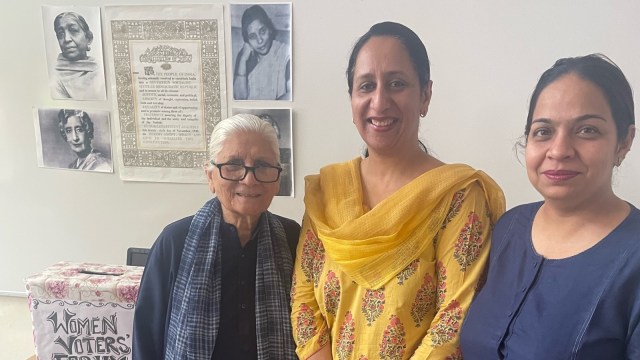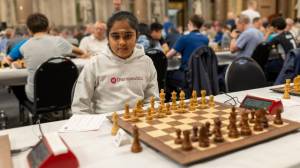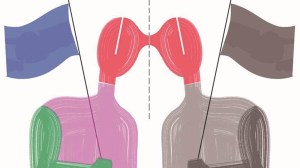In Chandigarh, a women’s forum to take on Lok Sabha candidates
The event took an unexpected turn when a group of women students caught a male student who had been harassing a woman a day earlier and gave him a sound thrashing.
 (From left) Professor Pam Rajput, Upinder Mangat and Deepika Bahri. (Express Photo)
(From left) Professor Pam Rajput, Upinder Mangat and Deepika Bahri. (Express Photo)“Don’t wait to be asked.” That’s the motto of a new initiative for women voters in Chandigarh by Pam Rajput, professor emeritus at the Centre for Women’s Studies & Development at Panjab University (PU).
The aim: To achieve a clean, green, and gender-just city. The initiative called Women Voters Forum is not only engaging with women of the City Beautiful to uncover the issues close to their hearts but also aims to acquaint the Lok Sabha candidates from the city with their demands and ensure that these are implemented.
The initiative, which has the blessings of the Central Election Commission, was born out of a capacity building workshop that professor Rajput conducted for women in politics in February this year, following the approval of the Women’s Reservation Bill in both Houses of Parliament last September. As per the Nari Shakti Vandan Adhiniyam, 2023 that came out of this Bill, one-third of all seats in the Lok Sabha and state legislative assemblies will now be reserved for women in each election. “However, in reality, we find that women are hesitant even to vote, let alone pursue a career in politics,” says Rajput.
The workshop led to the establishment of a WhatsApp group aptly called “Hum Hain”, roughly translated to “we exist”. With Lok Sabha polls around the corner, it also prompted Rajput to establish the Women Voters Forum.
“Chandigarh has 647,291 voters, of whom 335,060 are men and 312,198 are women. The difference between the two genders is very little. In Bihar, more women than men turn out to cast their votes. It can be the same in Chandigarh. So why should our LS candidates not lend an ear to them,” asks the PU professor.
Rajput has created a questionnaire to identify the issues that matter to the women in the city. Her dedicated band of volunteers includes Deepika Bahri, head of Women’s Indian Chamber of Commerce and Industry (WICCI), and Upneet Kaur Mangat, chairperson of the Centre for Human Rights and Duties at the Panjab University.
Initially sceptical about the questionnaire, Deepika is now a big fan. “We assume as women we know all about the issues that bother us, but there is so much that we don’t know,” she says.
Deepika received her first big surprise from a young woman employee at a bank near her Sector 8 office. “She asked for breastfeeding booths at public spaces. It’s such an important issue, but we had completely overlooked it.”
Upneet realised how sanitation was high on the priority list of women voters of Faida, a UT village that’s fast turning into another dumping ground.
Rajput says the three main concerns of women in rehabilitation colonies are safety, sanitation, and education besides substance abuse. “Numerous women are troubled by the financial strain of tuition fees and seek assurance from the new MP that schools prioritise quality education and eliminate the need for private tutoring.
Additionally, there’s a recurring concern about the menace of drugs and alcohol that we consistently hear being mentioned,” she adds.
Upneet says women also pointed to the ecological crises caused by the indiscriminate use of pavers that are choking the trees of the city and causing frequent flooding.
Rajput plans to present these issues to the Lok Sabha candidates at an open forum in the university and then draw up an accountability mechanism. “Often we have seen that elected representatives become inaccessible after being voted to power. And when reminded about their promises, they cite a lack of funds,” according to the PU professor.
This prompted Rajput, a former nominated councillor in the municipal corporation, to seek an action plan from the candidates, complete with financial grants for various projects.
If you believe this will just be an academic exercise, think again. Rajput likes to walk the talk.
The determined woman, who arrived in the city in 1962, organised the first significant student protest in 1964 when some boys tried to abduct a female student from PU hostel number 1. “We organised a march involving over a thousand college and university students to the secretariat and presented a memorandum to then Punjab Chief Minister Ram Kishan,” she recalls.
The event took an unexpected turn when a group of women students caught a male student who had been harassing a woman a day earlier and gave him a sound thrashing.
The Women Voters Forum might not be able to leave its impact in the ongoing election, but it has necessary ingredients to bring women voters in the forefront and is sufficiently inspired.







